In this section: Patrick Kabuya, Nadia Sanger, Vuyiseka Dubula, Vivienne Lalu and more…
Patrick Kabuya, senior financial management specialist: World Bank (Africa)

Raised by his grandmother in the rural areas of Kenya, Patrick Kabuya made a decision when he was young. He was going to make sure he obtained a good education. In 2008, this decision helped earn him a master’s in commerce from the University of Johannesburg.
Before moving to the World Bank as a senior financial management specialist for their African arm, Kabuya worked for Ernst &Young in Kenya and South Africa. His job now includes partnering with different stakeholders in many countries throughout the continent, including governments, regulators and professional accounting bodies in order to enhance financial reporting and accountability. Kabuya is a strong believer in education and leadership, which he says is lacking in Africa. And now he’s perfectly poised to help shape a bit of both. — Karabo Keepile
Lunch spot: Col’Cacchio, Benmore, Sandton, Johannesburg
Nadia Sanger, researcher
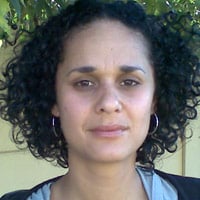
Nadia Sanger has been studying for the past 13 years and has every intention to continue for as long as she can. Sanger believes everybody should study for at least 20 years. She holds an honours degree in psychology as well as a master’s degree and doctorate in women and gender studies from the University of the Western Cape. The focus of Sanger’s studies is to investigate the issues surrounding gender and sexuality and how these are represented in contemporary media and film.
She is concerned that men and women are limited in the way that they are being portrayed, and that the emphasis on heterosexual roles impacts heavily on the development of youth. — Jane Steinacker
Lunch spot: Crush, St George’s Mall, Cape Town
Vuyiseka Dubula, general secretary: Treatment Action Campaign
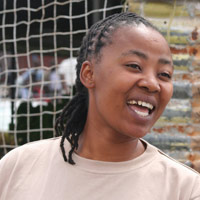
Vuyiseka Dubula has spent her career working in public health policy, social and youth development and human rights law.
She started her career at the Treatment Action Campaign (TAC) as a literacy coordinator in 2002. Since then, she has worked with the National Association of People Living With HIV/Aids and Medicines sans Frontiers, returning to the TAC as general secretary last year.
‘There are so many inequalities in our society,” says the 31-year-old, who received her BA in social health and social services from Unisa in 2008, ‘especially among poor people. From my own experience of living with HIV/Aids I know that the right of access to healthcare doesn’t come easily, especially if you are poor and don’t have money.” —Eamon Allan
Lunch spot: Obs Café, Observatory, Cape Town
Carina du Toit, attorney: Centre for Child Law, University of Pretoria
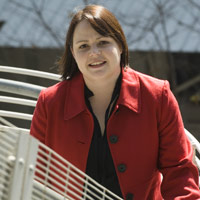
Since 2005, attorney Carina du Toit has spent her time fighting for children’s rights at the Centre for Child Law based at the University of Pretoria. She was an attorney for the centre’s most important case to date, where they are seeking to declare sections of the Criminal Law (sentencing) Amendment Act 41 of 2007 unconstitutional. The sections under scrutiny allow the imposition of minimum sentences, including life imprisonment for children who are as young as 16 or 17 when they commit the offence. The matter was referred to the Constitutional Court and was heard on March 5 this year. Judgment was reserved. — Jane Steinacker
Lunch spot: Tribeca, Brooklyn Design Square, Pretoria
Vivienne Lalu, advocacy programme coordinator: Sweat
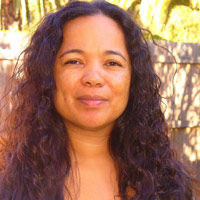
Vivienne Lalu gives a voice to the voiceless. Before moving to the Sex Worker Education and Advocacy Taskforce (Sweat), which promotes human rights for sex workers and campaigns for their decriminilisation, she was rural coordinator at the Western Cape Network on Violence Against Women, and a counsellor at Nicro and a centre for child abuse. Lalu also spent some time in the United Sates, where she worked with a domestic abuse project and a women’s drug treatment centre.
She says while people always assume that she feels burdened by her work, the strength of the women she meets makes it much easier. ‘Women are incredible; they learn to live and thrive in the most creative ways,” she says. Lalu says she does what she does because she feels that the position of the most marginal women, affects all women in society. — Ilham Rawoot
Lunch spot: Moyo, Zoo Lake, Johannesburg
Natalie Simons-Arendse, facilitator: Face to Face/Faith to Faith
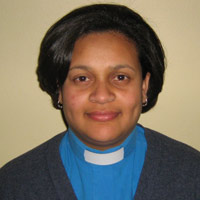
Anglican reverend Natalie Simons-Arendse has the potential to change the world. So says the World Economic Forum, which selected Simons-Arendse as a Young Global Leader in 2007.
Simons-Arendse’s work focuses on facilitating interfaith dialogue between youths from different backgrounds.
‘The idea is to help young people develop peace and understanding,” she says.
One of the youngest priests in the Anglican Church in Southern Africa, Simons-Arendse has a MTh in pastoral care and counselling from the University of Stellenbosch. She is the chaplain at St Cyprian’s School for Girls, her alma mater, where she teaches divinity, and is involved in Face to Face/Faith to Faith, an international multi-faith youth leadership programme. — Faranaaz Parker
Lunch spot: Chai Yo, Mowbray, Cape Town
Thokozile Budaza, activist

Thokozile Budaza is an award-winning activist who is passionate about children’s and women’s rights. The 26-year-old became involved in activism at university; she now speaks publicly about her experiences of child molestation and rape as an adult, and has dedicated her life to fighting against gender violence.
Budaza has worked for a number of international organisations such as Civicus, Action Aid and Engender Health. In 2006, Women Demand Dignity lobby group acknowledged her with a White Ribbon Award for her contribution in the area of violence against women and children.
Budaza is based at the Open Society Initiative for Southern Africa and serves on the board of Sonke Gender Justice. She is also part of an international youth network aimed at building youth leadership and highlighting youth and HIV/Aids issues. — Qudsiya Karrim
Lunch spot: F!sh, Rosebank, Johannesburg
Leigh Meinert, managing director: TSiBA Education
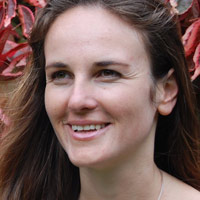
Leigh Meinert started making an impact early. At 15 she founded an NGO called Youth With Vision: For Young People Who Want To Make a Difference.
While still in school at Stellenbosch University, she ran her own accelerated learning centre teaching learning and life skills. Since then she has convened young people from around the world at the Parliament of the World’s Religions, worked as a strategic project facilitator in the corporate environment, and facilitated the Brightest Young Minds conference for four years.
With three co-founders, she started the Tertiary School in Business Administration (TSiBA), a private, not-for-profit business school in 2004. Two years later, at 27, Meinert was appointed managing director of the school. —Jane Steinacker
Lunch spot: Birds Café, Cape Town
Noluthando Ntlokwana, activist
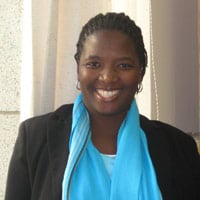
Noluthando Ntlokwana describes herself as ‘a feminist and womens rights activist.” In 2006, Ntlokwana was admitted as an attorney of the high court and now works as an attorney for the Women’s Legal Centre, based in Cape Town.
The non-profit centre, which is independently funded, was started by a group of women lawyers to advance women’s rights by conducting constitutional litigation and advocacy on gender issues. Ntlokwana holds an LLB and, in 2002, completed her clerkship at the Legal Resources Centre. She is now completing a master’s degree in constitutional litigation, with a thesis focusing on customary law and women’s rights. — Karabo Keepile
Lunch spot: Marcos, Cape Town
Sholom Ncala, aids activist
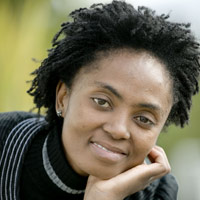
When Sholom Ncala was diagnosed HIV positive on December 12 2000, she did not fade into the woodwork. Instead, she went on televison and hosted Siyayinqoba on SABC1, sharing her life story and experiences with others who are HIV positive.
Now, Ncala, who works as a receptionist for the Aids Law Project, also lends her profile to companies such as Liberty Life to help them create informative screenings on HIV and the use of antiretrovirals.
Ncala says there is still a lot of stigma attached to those affected by the virus and she plans to keep her message going out to those living with HIV.
Her next wish for disseminating the good word? A radio gig. — Jane Steinacker
Lunch spot: Primi Piatti, Melrose Arch, Johannesburg